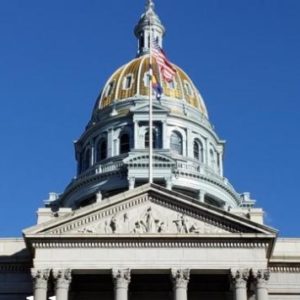By Julie Pelegrin
Since we last posted, everything has come to a screeching halt – sort of. Last Saturday, the General Assembly took the extremely rare step of adjourning for two weeks in the middle of the regular legislative session. The existence of a declared epidemic disaster emergency and the need to implement drastic measures to mitigate the spread of COVID-19 led the General Assembly to make this serious move.
So why is this step so rare? The Colorado constitution prohibits both the House and the Senate from adjourning for more than three days, unless they both agree. On Saturday, both houses passed House Joint Resolution 20-1007, which temporarily adjourned both houses until March 30, 2020.
This type of temporary adjournment wasn’t always such a rare occurrence. There was a time when it was fairly common for the General Assembly to adjourn for more than three days to a date certain (as opposed to adjourning sine die, which ends the session) during a regular legislative session. These temporary adjournments would occur for a variety of reasons, generally to manage the legislative session and provide time to develop policy or return to consider vetoes.
So what changed? In 1988, the General Assembly referred Senate Concurrent Resolution No. 1 to the ballot to amend section 7 of article V of the state constitution. At that time, this section of the state constitution limited regular legislative sessions convened in even-numbered years to 140 calendar days; there was no limit on the length of sessions during odd-numbered years. The amendment changed the language to limit all regular legislative sessions to 120 calendar days.
And that’s one of the reasons why this temporary adjournment is so serious: How long may the regular legislative session continue after the General Assembly reconvenes? Section 7 of article V of the Colorado constitution limits the regular legislative session to 120 calendar days. But exactly what does that mean?
Only the Colorado Supreme Court can provide a definitive answer to that question. Fortunately, there’s a constitutional process for asking.
Section 3 of article IV of the Colorado constitution describes the Supreme Court’s authority and specifically directs the Court to give “its opinion upon important questions upon solemn occasions when required by the governor, the senate, or the house of representatives …” While the language sounds like the Court must answer these questions — they’re officially referred to as “interrogatories” — whenever posed, the Court actually has great discretion in deciding whether to answer. The Court decides whether a question is really important and whether the occasion is sufficiently solemn.
Since Colorado became a state in 1876, the General Assembly has sent interrogatories to the Supreme Court 88 times. The Court agreed to answer all of the questions posed 58 times, agreed to answer some of the questions eight times, and refused to answer 15 times. The  governor has sent interrogatories to the Supreme Court 47 times. Nineteen times, the questions were related to legislation that was either pending in the legislature or sitting on the governor’s desk awaiting his signature. The other 28 times, the governor was asking questions that were not directly related to legislation. Most of the time – 33 out of the 47 – the Supreme Court agreed to answer the interrogatories.
governor has sent interrogatories to the Supreme Court 47 times. Nineteen times, the questions were related to legislation that was either pending in the legislature or sitting on the governor’s desk awaiting his signature. The other 28 times, the governor was asking questions that were not directly related to legislation. Most of the time – 33 out of the 47 – the Supreme Court agreed to answer the interrogatories.
In what appears to be the first interrogatory submitted in Colorado, the General Assembly asked about the constitutionality of certain provisions of the state constitution concerning water. The Supreme Court refused to answer because the interrogatory did not relate to pending legislation. Also, the Court did not find the situation grave or urgent enough to warrant giving an answer. Most recently, the Court has agreed to answer questions about the nature of certain federal funds and the authority to appropriate them, and whether voter approval is required to approve a certain type of funding mechanism for transportation. In both situations, the questions were related to pending legislation.
Generally, in deciding whether to accept interrogatories, the Supreme Court has said the interrogatory must “be connected with pending legislation, and relate either to the constitutionality thereof or to matters connected therewith of purely public right.“
So, returning to the question at hand concerning the meaning of 120 “calendar days,” on Saturday, the General Assembly passed House Joint Resolution 20-1006 asking the Supreme Court to answer the following question:
Does the provision of section 7 of article V of the state constitution that limits the length of the regular legislative session to “one hundred twenty calendar days” require that those days be counted consecutively and continuously beginning with the first day on which the regular legislative session convenes or may the General Assembly for purposes of operating during a declared disaster emergency interpret the limitation as applying only to calendar days on which the Senate or the House of Representatives, or both, convene in regular legislative session?
On Monday, March 16, the Supreme Court accepted the interrogatories. The General Assembly, the Governor, the Attorney General, and any other interested persons are invited to submit briefs by Tuesday, March 24. Sometime after that, the Supreme Court will issue its answer. Stay tuned!

